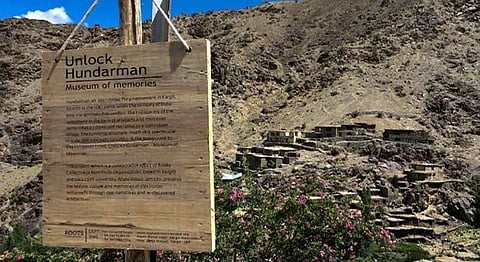
- HOMEGROWN WORLD
- #HGCREATORS
- #HGEXPLORE
- #HGVOICES
- #HGSHOP
- CAREERS
- ABOUT US
- CONTACT US

It’s not something we think about often, but you can tell a lot about a person’s life from their possessions. Extravagant and luxurious or meagre and frugal, the objects we hold on to tell a tale of their own – of a life lived, memories and nostalgia, both haunting and happy. But in times of crisis, if you had to pick one object from all the things that you possess and flee, what would it be? From your endless possessions of wealth, utility and sentimentality, what would you leave?
More often than not people that have sadly found themselves in this position leave it all behind – their homes, their routines, things and their life as they knew it. Such has been the unfortunate case of Hunderman, a village nestled on the cusp of the Line of Control, among one of the most fraught terrains in the world.
Located along the India-Pakistan border this Kargil town has its own woeful tale to tell. Once a prominent locale on the infamous Silk Route, it found itself caught in multiple skirmishes over the uncertain international border and wars with Pakistan, namely Kargil.
The village of Hunderman Brok was claimed and then reclaimed by the two fighting sides, with many villagers fleeing their homeland along with the Pakistan army while others were rendered refugees or nationals of the other country overnight simply for being at the wrong place at the wrong time. These people had the imaginary line of a border disconnect them from their families that got left behind and their homes. Such has been the tumultuous life of border families, yet we know and hear little about them, the people that face the impact of political and military decisions made high up, on the ground level. With the loss of livelihoods, little prospects left when it came to survival, many villagers relocated themselves to nearby hamlets in search of a better life, with Hunderman becoming a ghost village – with empty homes, streets and an array of personal possessions lying abandoned.
If walls could talk, Hunderman could narrate its own histories. These narratives started to come to light when Ilyas Ansari returned to his ancestral home in the village. With the guidance of Roots Collective, Ansari slowly converted his family’s home into a museum of personal histories and memories. On display at Unlock Hunderman—Museum of Memories are dusty artefacts unearthed from across the region, but these aren’t what you’d normally expect to see at an exhibit.
“The village is silent as if someone is hiding, holding their breath and walking slow steps; leading us to discover what people have left behind. A container of french coffee, medicines from USA, books from Lahore, currency from East Pakistan, shoe polish from Central Asia and countless other items of daily use. We also discover tools for farming, fishing and hunting,” states Roots Collective on their website regarding this initiative.
Along with Ansari, the team is working to convert this once abandoned village into a heritage site, of sorts, by promoting exhibitions, artist residencies, workshops and architecture research programs, drawing people to the site and to the museum. Each object on display captures within itself memories of relationships people’s pasts, whether it’s bullets, shrapnel, jewellery or a cup and saucer.
Perhaps the most poignant in the collection is the framed letter written by Ansari’s uncle to his family in which he laments his inability to return home after the territory came under Indian control during the 1971 war, while he himself was away. On display is also the very first identity card that was issued by the Jammu and Kashmir government to his grandfather.
When you really think about it, it’s hard to put a value on the things we own. Many of us don’t even realise it until it’s too late. But when you live on the border, holding on to such things seems futile. In times of war, the land may seemingly have forgotten its former inhabitant and the people displaced work towards building new lives, but the echoes of the lives they once lived reverberate through the walls. We need to know where we’ve come from to know where we’re going.
If you enjoyed this article we suggest you read:
